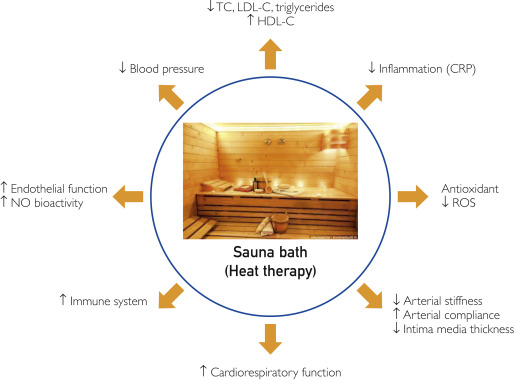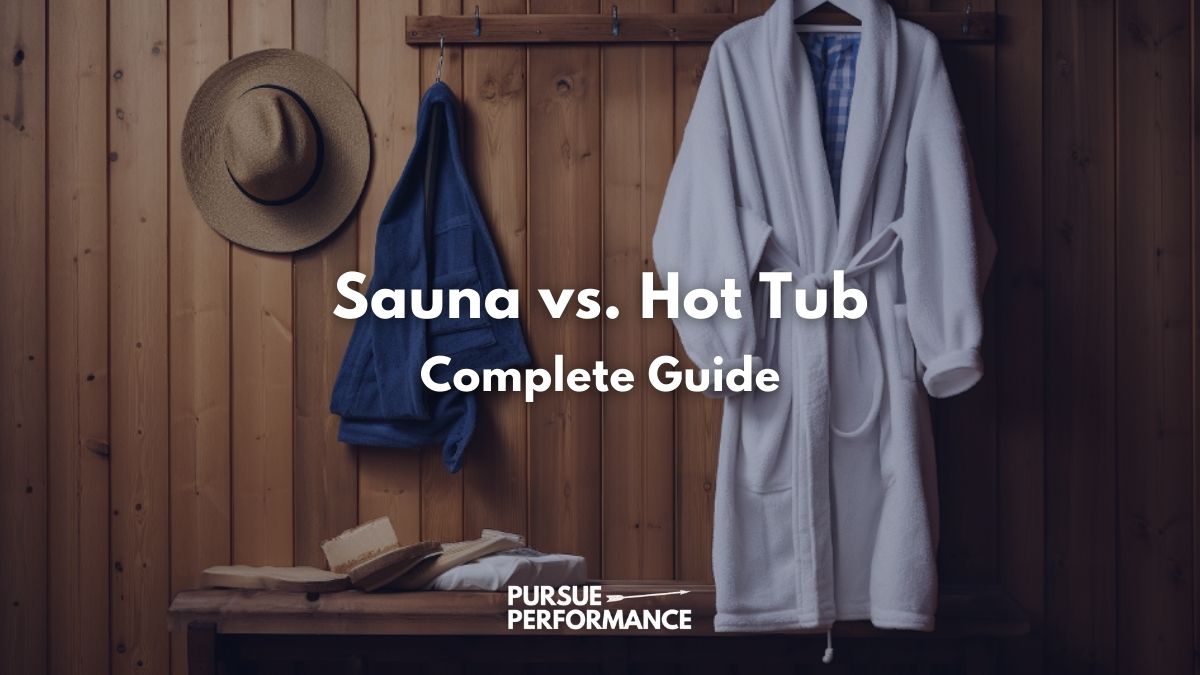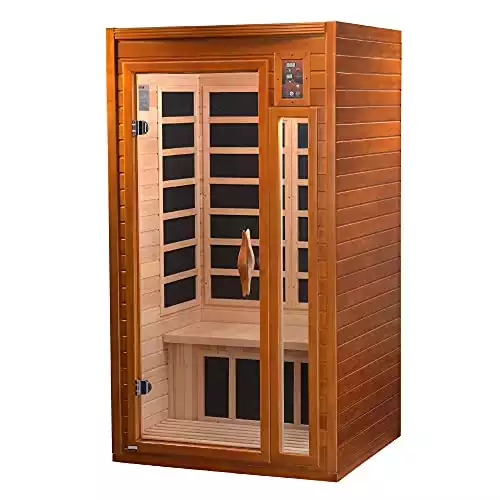When it comes to creating your own home wellness retreat or choosing the right recovery protocol, two prominent features often come to mind: the
Both options offer unique benefits, yet they each have their distinct characteristics.
In this post, we dive deep into the heated debate of
Let’s jump into it!
Sauna vs. Hot Tub: Which One is Right for You?

Saunas and hot tubs offer different experiences and benefits, but choosing between the two depends on your specific needs and preferences.
Do you value the soothing feeling of hot water on your skin, or do you prefer the dry heat of a
Your decision might also depend on your health and wellness objectives, the available space in your home, and your budget.
Related: Joe Rogan Sauna: Type, Routine, & Benefits
Similarities And Differences Between Sauna and Hot Tub
| Sauna | Hot Tub | |
|---|---|---|
| Function | Uses heat (either infrared or traditional) to create a hot, dry environment. | Uses heated water to create a warm, wet environment. |
| Health Benefits | Promotes detoxification, improves cardiovascular health, aids in muscle recovery, enhances mood. | Alleviates muscle and joint pain, promotes relaxation, improves sleep, may improve cardiovascular health. |
| Installation | Requires dedicated space; can be indoors or outdoors. | Requires a water connection; mostly outdoors. |
| Maintenance | Requires less maintenance, with periodic cleaning and inspection of the heater. | Requires frequent water treatment and filter changes. |
What are the Benefits of a Sauna ?

Saunas, with their centuries-old tradition, have been scientifically proven to offer a plethora of health benefits, making them a worthy addition to any performance optimization regimen.
1. Detoxification
Saunas generate intense heat, which elevates the body’s core temperature and triggers profuse sweating.
According to a 2012 study in the Journal of Environmental and Public Health, this sweating process helps the body expel harmful toxins, including heavy metals like lead, arsenic, and cadmium.
This detoxification process leaves you feeling cleansed and rejuvenated.
Related: Why Don’t I Sweat in the Sauna?
2. Cardiovascular Health

A 2018 report published in Mayo Clinic reviewed data linking Finnish
The literature reviewed studies with over 1,000 participants and found that
Related: Andrew Huberman Sauna: Complete Guide
3. Relaxation and Stress Relief
Saunas stimulate the production of endorphins, the body’s natural feel-good chemicals, which induce a state of tranquility and happiness.
A study included in Evidence-based Complementary and Alternative Medicine review found that
Related: Does Sauna Help Bloating?
4. Improved Sleep
The calming heat of the
An online 71-item questionnaire from 2016 to 2017 found that 83.5% of respondents reported improved sleep quality, particularly in individuals with sleep disorders.
5. Muscle Recovery
Saunas help increase blood circulation, delivering nutrient-rich blood to tired and strained muscles, and promoting faster recovery.
A study in SpringerPlus (2015) found that
Related: Creatine and Sauna: Complete Guide
What are the Benefits of a Hot Tub?

While different in their approach, hot tubs offer their own set of performance-enhancing benefits:
1. Muscle and Joint Pain Relief
The buoyancy of the warm water in a hot tub alleviates pressure on joints and muscles, making it an excellent therapy for those with arthritis or sports injuries.
A 2014 review in the North American Journal of Medical Sciences reported improvements in pain and function among arthritis patients who utilized hydrotherapy.
2. Stress Relief
Hot tubs, through warm water therapy or hydrotherapy, can stimulate the body’s natural relaxation response.
A 2018 study in the International Journal of Biometeorology found that hydrotherapy reduced cortisol levels (the body’s stress hormone) and boosted mood states.
3. Improved Sleep
Just like saunas, hot tubs can help prepare your body for a good night’s sleep.
According to the National Sleep Foundation, soaking in hot water before bed can ease the transition into a deeper sleep by raising your body temperature and then rapidly cooling it upon exiting the tub.
4. Social Interaction
Beyond physical benefits, hot tubs offer an opportunity for social interaction, contributing to overall mental well-being.
This social aspect can enhance mood, reduce feelings of isolation, and foster connections, all of which are integral to optimized performance.
5. Potential Cardiovascular Health Improvement
Immersion in hot water can induce heart-healthy effects similar to light exercise.
A 2018 study in the Journal of Physiology showed that hot tub bathing increased heart rate and lowered blood pressure, suggesting a potential role in promoting cardiovascular health.
Hot Tub vs. Sauna For Detox
Research suggests that while both hot tubs and saunas are effective in facilitating detoxification, saunas may have an edge due to the intense sweating they induce.
Saunas, particularly the dry heat version, encourage profuse sweating – a natural mechanism for expelling toxins and impurities from the body.
That being said, detoxification is still not a clearly defined scientific term.
One meta-study was unable to isolate statistically significant differences in blood serum levels between
However, the study acknowledged that self-reported benefits of
So, the bottom line is that science is still catching up on its understanding of detoxification.
Deciding Factors Between Hot Tub and Sauna
Choosing between a
The decision changes significantly if you’re considering buying a
To aid your decision-making process, here are some key factors you should consider.
Personal Preferences and Health Needs
What are your wellness goals?
If you’re primarily looking for detoxification, enhanced cardiovascular health, or improved sleep, a
On the other hand, if you’re seeking relief from muscle or joint pain, or looking for a relaxation tool that can also serve as a social centerpiece, a hot tub might be the right choice.
Space Availability and Location
The available space in your home will significantly influence your decision.
Saunas can fit in a relatively smaller area and can be placed either indoors or outdoors.
In contrast, hot tubs typically require more space and are usually installed outdoors due to the need for water drainage and ventilation.
Budget
Cost is another crucial deciding factor.
Typically, both saunas and hot tubs can be a significant investment, but the costs vary widely depending on the type, size, and features of the unit.
Saunas can range from a few hundred dollars for a portable model to several thousand for an outdoor, wood-fired unit.
Hot tubs, on the other hand, usually start in the low thousands and can go up to tens of thousands for high-end models.
Make sure to take into account not just the initial investment, but also the ongoing costs of maintenance, repairs, and energy usage.
Maintenance
While both require regular maintenance, hot tubs generally require more due to the need for constant water treatment to keep the water clean and safe.
Saunas, particularly infrared models, require less maintenance, often limited to periodic cleaning and occasional checks of the heating element.
Frequently Asked Questions (FAQ)
Which is better for you a hot tub or a sauna ?
The answer depends on your specific needs and health conditions.
Saunas can offer significant detoxification benefits and enhance cardiovascular health, while hot tubs are particularly effective for soothing muscle and joint pain.
Why is a sauna better than a hot tub?
Saunas may offer more potent detoxification benefits, thanks to the sweating process.
They generally require less maintenance than hot tubs. However, this doesn’t necessarily mean saunas are better—just different.
Does a hot bath have the same health benefits as a sauna ?
While a hot bath can offer some similar benefits, such as relaxation and improved sleep, it does not provide the same level of heat exposure as a
A
What is the downside of saunas?
While saunas offer many benefits, they may not be suitable for everyone.
People with certain health conditions, such as low blood pressure or certain heart conditions, should consult a doctor before using a
Additionally, they can cause dehydration if not used properly.
Does a hot tub detox you?
While hot tubs can promote sweating—a natural detoxification process—they are not as effective as saunas for this purpose.
Nonetheless, they can still aid in overall relaxation and well-being.










